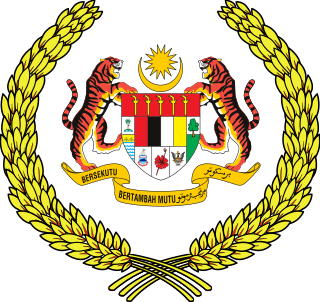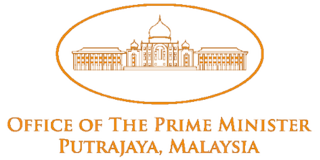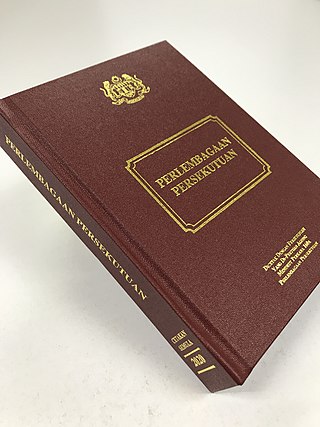Politics of Malaysia takes place in the framework of a federal representative democratic constitutional monarchy, in which the Yang di-Pertuan Agong is head of state and the Prime Minister of Malaysia is the head of government. Executive power is exercised by the federal government and the 13 state governments. Legislative power is vested in the federal parliament and the 13 state assemblies. The judiciary is independent of the executive and the legislature, though the executive maintains a certain level of influence in the appointment of judges to the courts.

The Yang di-Pertuan Agong, also known as the Supreme Head of the Federation, the Paramount Ruler or simply the Agong, and unofficially known as the King of Malaysia, is the constitutional monarch and head of state of Malaysia. The office was established in 1957, when the Federation of Malaya gained independence from the United Kingdom. The Yang di-Pertuan Agong is elected by the Conference of Rulers, comprising the nine rulers of the Malay states, with the office de facto rotated between them, making Malaysia one of the world's few elective monarchies.
In Malaysia, the Yang di-Pertua Negeri is a constitutional title given to the head of state in states without a ruler, namely: Penang, Malacca, Sabah and Sarawak. This is in contrast to a Ruler which is a constitutional title given to states with hereditary monarchies, namely: the Sultans of Johor, Kedah, Kelantan, Pahang, Perak, Selangor and Terengganu; the Raja of Perlis: and the Yang di-Pertuan Besar of Negeri Sembilan.

The Prime Minister of Malaysia is the head of government of Malaysia. The prime minister directs the executive branch of the federal government. The Yang di-Pertuan Agong appoints the prime minister as a member of Parliament (MP) who, in his opinion, is most likely to command the confidence of a majority of MPs. This person is usually the leader of the party winning the most seats in a general election.

The Federal Constitution of Malaysia, which came into force in 1957 as the Constitution of the Federation of Malaya and was amended in 1963 to form the Constitution of Malaysia, is the supreme law of Malaysia and contains a total of 183 articles. It is a written legal document influenced by two previous documents, the Federation of Malaya Agreement 1948 and the Independence Constitution of 1957. The Federation was initially called the Federation of Malaya and it adopted its present name, Malaysia, when the states of Sabah, Sarawak and Singapore became part of the Federation. The Constitution establishes the Federation as a constitutional monarchy, having the Yang di-Pertuan Agong as the Head of State with largely ceremonial roles. It provides for the establishment and organisation of three main branches of the government: the bicameral legislative branch called the Parliament, which consists of the House of Representatives and the Senate ; the executive branch led by the Prime Minister and his Cabinet Ministers and the judicial branch headed by the Federal Court.

Raja Permaisuri Agong is the title given to the consort of the Yang di-Pertuan Agong, the elected, constitutional federal monarch of Malaysia.

Judiciary of Malaysia is largely centralised despite Malaysia's federal constitution, heavily influenced by the English common law, as well as Islamic jurisprudence.
The Cabinet of Malaysia is the executive branch of the Government of Malaysia. Led by the Prime Minister, the cabinet is a council of ministers who are accountable collectively to the Parliament. According to the Article 43 of the Federal Constitution, members of the Cabinet can only be selected from members of either houses of Parliament. Formally, the Yang di-Pertuan Agong appoints all Ministers on the advice of the Prime Minister. The constitution is amended by repealing the Clause (8) of Article 43, enabling a person who is a member of State Legislative Assembly to continue to serve even while serving as a minister or deputy minister in the cabinet. Ministers other than the Prime Minister shall hold office during the pleasure of the Yang di-Pertuan Agong, unless the appointment of any Minister shall have been revoked by the Yang di-Pertuan Agong on the advice of the Prime Minister but any Minister may resign from office. In practice, the Yang di-Pertuan Agong is obliged to follow the advice of the Prime Minister on the appointment and dismissal of ministers.

The Government of Malaysia, officially the Federal Government of Malaysia, is based in the Federal Territory of Putrajaya, with the exception of the legislative branch, which is located in Kuala Lumpur. Malaysia is a federation comprising the 11 States of Malaya, the Borneo States of Sabah and Sarawak, and 3 Federal Territories operating within a constitutional monarchy under the Westminster system and is categorised as a representative democracy. The federal government of Malaysia adheres to and is created by the Federal Constitution of Malaysia, the supreme law of the land.

The Chief Justice of Malaysia, also known as the chief justice of the Federal Court, is the office and title of the head of the Malaysian judiciary system. The title has been in use since 1994, and prior to this it was known as the lord president of the Federal Court. The chief justice is the head of the Federal Court, the apex court of Malaysia. It is the highest position in Malaysian judicial system followed by the president of the Court of Appeal of Malaysia, chief judge of Malaya, and the chief judge of Sabah and Sarawak.

The Supreme Commander or Commander-in-Chief of the Malaysian Armed Forces is the highest-ranking office in the command structure of the Malaysian military. The office dates to the 1957 creation of the Malay federation. Its current role, duties and powers are regulated by the Constitution of Malaysia and the Federal Armed Forces Act.
The Chief Judge of Sabah and Sarawak, formerly the Chief Justice of Borneo, is the office and title of the head of the High Court of Sabah and Sarawak. The title has been in use since 24 June 1994, when the High Court of Sabah and Sarawak was renamed from the High Court of Borneo.
Tan Sri Datuk Seri Panglima Abdul Gani bin Patail is a Malaysian prosecutor. He was the Attorney General of Malaysia from 2002 to 2015, the first from Sabah to hold the position.
The installation of the Yang di-Pertuan Agong is a ceremony that formally marks the beginning of the reign of the Yang di-Pertuan Agong as the Malaysian head of state.

Tommy Thomas is a Malaysian barrister and the former Attorney General of Malaysia from 2018 to 2020. He was the first practising barrister to be appointed directly from the Malaysian Bar to be the Attorney General, and the first non-Malay and non-Muslim Malaysian to hold this post after the formation of Malaysia in 1963.
Tan Sri Dato' Sri Ahmad bin Haji Maarop is a Malaysian jurist and lawyer who served as the tenth President of the Court of Appeal of Malaysia (PCA).
Azahar bin Mohamed is a retired Malaysian judge and lawyer who served as the 12th Chief Judge of the High Court of Malaya from August 2019 to his retirement in October 2022.
Rohana binti Yusuf is the eleventh President of the Court of Appeal of Malaysia (PCA). She is the first woman to have been appointed into the office since its inception in 1994.

Tan Sri Datuk Amar Abang Iskandar bin Abang Hashim is a Malaysian lawyer and judge who serves as the twelfth President of the Court of Appeal. He previously served as the Chief Judge of Sabah and Sarawak (CJSS).

Shamrahayu binti A. Aziz is a law lecturer at the Ahmad Ibrahim Kulliyyah of Laws (AIKOL), International Islamic University of Malaysia (IIUM), Malaysia, and the incumbent Institution of the Malay Rulers Chair at Universiti Teknologi Mara (UiTM). She writes weekly as a columnist on the Malay daily newspaper, Berita Harian, as well as on her website. She does many research regarding Malaysian national affairs, the Malaysian Federal Constitution, Sharia law, and human rights. She is also a Principal Fellow at the Institute of Islamic Understanding Malaysia (IKIM).










